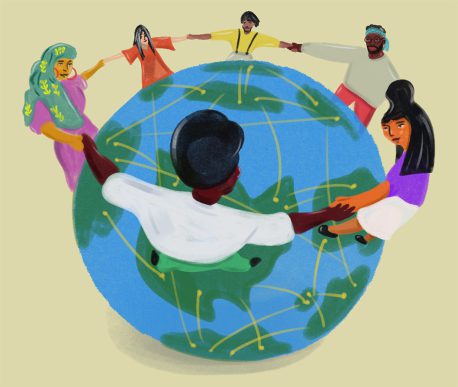Well, here we are—at the end of our blogging adventure. It’s been a whirlwind of ideas, late-night brainstorms and endless coffee refills. But somehow, we made it. And we couldn’t be prouder (or more relieved). This blog started as a class project but quickly became a space where we got to tackle some of the most pressing issues of our time. We’ve gone on deep dives into gender inequalities in tech, the shadowy underbelly of AI governance, and the relentless power grab by Big Tech. It’s been messy, challenging, and at some points rewarding. Through it all, we learned not just about the topics we covered but about the art of communicating them—and we hope you did, too.
This blog was about exploring, questioning, and finding ways to make sense of some of the most complex issues shaping our global economy today. And it was about starting conversations—whether those were in the comments section, on social media, or even among ourselves.
So, before we say our goodbyes, let’s take a walk down memory lane and revisit some of the key themes we tackled:
- Eva looked at gender, sustainability, and the way technology enables modern slavery, uncovering the hidden cost of our digital convenience.
- Anisa opened our eyes to the concept of techno-patriarchy, showing how AI and platform capitalism are quietly reinforcing gender inequalities.
- Andrei took a hard look at structural inequalities baked into the design of digital products and services—and the power dynamics behind them.
- Daniel questioned the frameworks (or lack thereof) for international oversight of AI, challenging us to think about who gets to set the rules for emerging technologies.
- Preetha uncovered the stories behind the data work and gig economy that power AI, showing us the human labor often hidden in plain sight.
- Elia analyzed how platform capitalism widens the gap between the privileged and the exploited, fueled by Big Tech’s growing monopoly on resources and labor.
Together, these perspectives contributed to spark interesting conversations, understanding more how to communicate the complexities of our global political economy. While our individual articles addressed different facets of these issues, they were united by common threads: a focus on inequality, a critique of exploitative systems, and a call to imagine a better future. We asked big questions, grappled with complex issues, and hopefully got you thinking about the systems shaping our world.
This blog taught us a lot—about the world, about writing, and about each other. Tackling topics like inequality, AI, and labor exploitation required us to break down complex ideas into something more digestible, without losing the nuance.
Writing this blog was as much a process of discovery as it was an exercise in communication. Each of us came to this project with questions we wanted to explore, and in the course of researching and writing, we found answers—as well as new questions. One of the most valuable lessons we learned was the importance of collaboration. Each article was not just the product of one writer’s effort but also the result of collective brainstorming, feedback, and refinement. This process pushed us to think beyond our individual perspectives and consider how our work fit into the broader narrative of the blog.
We hope this blog has inspired you to think critically about the systems that shape our world and to ask the difficult but necessary questions: Who holds power? Who benefits? And how can we create a more just and equitable global economy?
As we wrap up, we want to say a massive thank you for being part of this. Your engagement, whether it was through reading, sharing, or just thinking critically about these issues, means a lot to us and if there’s one thing we hope you take away, it’s this: the more we question, the closer we get to change.
Until next time,
Group 5

